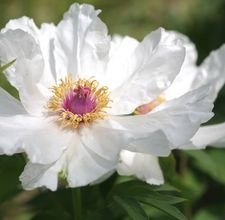Peony japonica (Paeonia japonica) is a type of peony that’s native to Japan. This perennial is classified as a "tree" perennial, according to Colorado State University. This means that Peony japonica does not die back to the ground every year, but instead continues to grow. Like all peonies, the roots of Japanese peony can be ground for various medicinal uses, including anti-bacterial and anti-inflammatory purposes.
Appearance
-
The Japanese peony has large, attractive cup-shaped white flowers with bright yellow stamens, which house the pollen in the center of the cups. The large-lobed leaves are arranged in pairs along the stems. This plant can grow up to 18 inches tall. In the summer, the Japanese peony produces attractive fruits that are red with blue seeds perched on top.
Climate
-
Paeonia japonica grows best in United States Department of Agriculture (USDA) growing zones 4 through 7. They can also grow in zone 8 in the shade. These are temperate areas that feature mild winters and summers.
Culture
-
The peony japonica is tolerant of a wide range of soil types—even heavy clay soil. However, it cannot tolerate overly wet soil, which can lead to root rot. The Japanese peony also cannot tolerate soil that is completely dry. Keep the soil around this plant slightly moist. This shrub does best in full sunlight in cooler growing zones or partial to full shade in a warmer growing zone.
Maintenance
-
The Japanese peony shrub can spread rapidly and even become invasive, crowding out other desirable plants. In addition, it is difficult to transplant. The Japanese peony does not like to have its roots disturbed, according to information published by Plants for a Future, a database of over 7,000 species of edible and medicinal plants. Be sure to plant it in a location where it will not overwhelm neighboring plants and where it can stay for a long time without having to be moved.
Pests and Diseases
-
Peony japonica is rarely bothered by grazing rabbits or deer. It is also fairly resistant to insects. In general, ants tend to like peonies, but they cause no harm to the plant. Some bacterial or fungal diseases, such as blight, can occasionally infect the peony, causing the buds to drop off before they can open. An application of fungicide in the spring can prevent fungal diseases from developing.


Deprecated: strpos(): Passing null to parameter #1 ($haystack) of type string is deprecated in /home/agriviek8Qv/agriviet.net/public_html/wp-includes/comment-template.php on line 2522